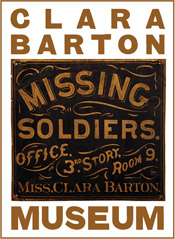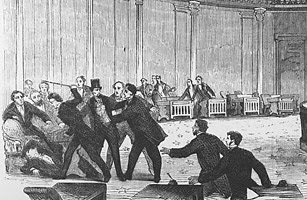Bully For Clara?
As Paul Harvey used to say, “and now, the rest of the story.” In an interview with Lenora Halstead in 1890, Miss Barton gives some details of her work that shed a good deal of light about how her co-workers treated her. She told Ms. Halstead,
The carriage of the Comm[issioner] of Patents called with the request that I sh[oul]d get in & drive down to see him. It was a most unusual thing for a woman to go to one of the Dep[ar]t[ment]s; in those days there was not a woman on their payrolls not one. There were a few women, the d[aughte]rs and widow of a man who had died who did his work & rec’d pay in his name, but this was substitution and was almost unknown. However, I got into the carriage & went to see the Comm. as requested. In his room the first person I saw was an old friend of my father’s who had known me from childhood and who welcomed me cordially. The Comm. asked me, he said after he had presented me, if I know of a man of perfect integrity & trustworthiness, whoed [sic] do some important work for him in finding out where frauds had been perpetrated in his accounts, and I told him I knew of no such man, but I did know a woman who c[oul]d exactly serve him and he told me to send for her, & so hereyou are. I tried to disclaim his praises but the Comm w[oul]d not listen to me & only asked me if I w[oul]d take the place? I said, ‘Why, I don’t know why I sh[oul]dn’t, yes, I will.” “Very well,” said he, “I am delighted to hear it now when you can come?” “There you choose, said I. “Can you stay now?” “Certainly, “ and I took off my bonnet & shawl & staid [sic]. I worked in that office from that time; I found the frauds, & my service was the first woman’s name to go on the payrolls. It made a great commotion. The clerks; they knew what it meant, & they tried to make the place too hard for me. It wasn’t a pleasant experience, in fact, it was very trying, but I thought perhaps there was some question of principle involved & I lived it through.
Unfortunately, there was nothing Barton could do about the bullies, but it is a shame Mason did not do anything to stop it, or some other man at the Patent Office. Evidently, according to the Workplace Bullying Institute, that is not unusual and sometimes, as in the case in football, it appears even conducted or sanctioned by leadership. The institute points out that workplace bullying actually reduces the productivity and revenue for an organization that does nothing to stop it.
For more information about today’s problems with workplace bullying, go to http://www.workplacebullying.org.


